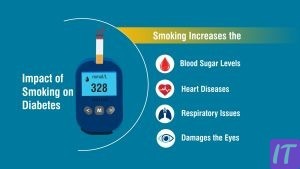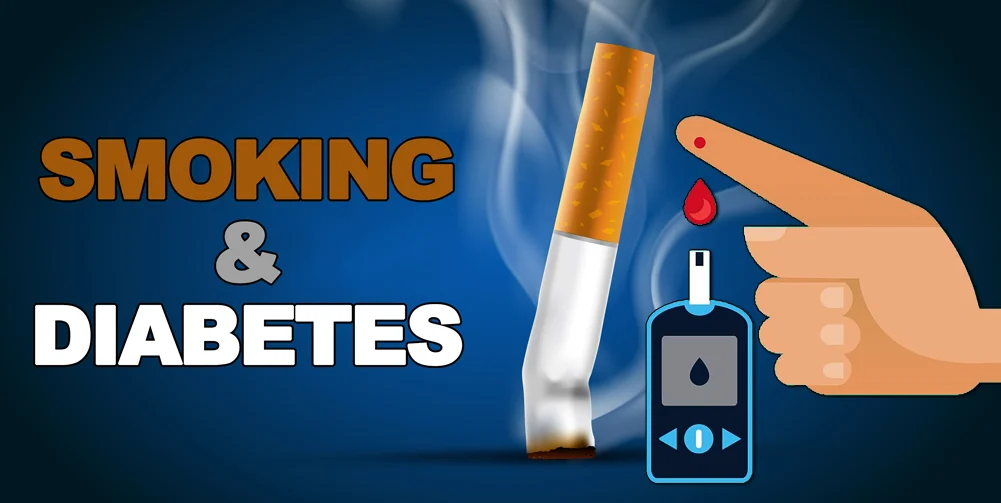The Effect of Smoking on Diabetes: An Academic Analysis
Introduction to Smoking and Diabetes: An In-Depth Analysis
Smoking remains a leading preventable cause of morbidity and mortality worldwide. In the context of diabetes, a chronic condition characterized by deranged glucose metabolism, smoking poses additional risks. The interplay between smoking and diabetes exacerbates the severity of both conditions, leading to complex health complications. This article provides an in-depth analysis of how smoking affects diabetes, including the underlying biochemical mechanisms, the resulting clinical manifestations, and the broader public health implications.
How Smoking Exacerbates Diabetes: A Comprehensive Review
Research has consistently shown that smoking worsens the prognosis of diabetic patients. Smokers with diabetes face an elevated risk of developing cardiovascular disease, kidney dysfunction, and other serious complications compared to non-smokers. Chronic exposure to the toxic substances in cigarettes, such as nicotine and carbon monoxide, adversely impacts insulin sensitivity and glucose homeostasis. Understanding the nuances of how smoking exacerbates diabetes requires a comprehensive assessment of both its direct and indirect effects on metabolic health.
The Biochemical Mechanisms Linking Smoking to Diabetes
Smoking introduces a variety of harmful chemicals into the body, which can disrupt normal biochemical processes. Nicotine, for example, can activate the sympathetic nervous system, leading to increased insulin resistance. Smoking also induces a pro-inflammatory state, marked by elevated levels of cytokines such as IL-6 and TNF-alpha, which further impair insulin signaling pathways. These biochemical disruptions collectively elucidate the mechanisms through which smoking aggravates diabetes.

Understanding the Impact of Nicotine on Blood Glucose Levels
Nicotine, the primary addictive component of tobacco, has profound effects on blood glucose regulation. It stimulates the release of catecholamines, such as adrenaline, which can increase blood glucose by promoting hepatic glucose production. Additionally, nicotine can reduce insulin secretion from pancreatic beta cells. This dual impact on glucose levels underscores why nicotine is particularly detrimental to diabetic individuals.
Smoking and Insulin Resistance: Exploring the Connection
Insulin resistance is a hallmark of Type 2 diabetes and is exacerbated by smoking. The constituents of cigarette smoke interfere with insulin’s ability to facilitate glucose uptake in cells. Mechanistically, smoking alters the expression of insulin receptors and disrupts signaling cascades such as the PI3K/Akt pathway. These disturbances culminate in diminished insulin sensitivity, necessitating a deeper exploration of this connection.
The Role of Oxidative Stress in Smoking-Induced Diabetic Complications
Oxidative stress, characterized by an imbalance between reactive oxygen species (ROS) and antioxidant defenses, is a critical factor in the pathogenesis of diabetic complications. Smoking significantly contributes to oxidative stress by generating free radicals that damage cellular structures and impair metabolic functions. This heightened oxidative state exacerbates diabetic neuropathy, retinopathy, and nephropathy, thus highlighting the need to mitigate oxidative stress in diabetic smokers.
Epidemiological Evidence of Smoking’s Effects on Diabetes Progression
Numerous epidemiological studies have documented the detrimental effects of smoking on the progression of diabetes. Longitudinal data indicate that smokers are at a higher risk of developing diabetes and that smoking accelerates the onset of diabetic complications. Statistical analyses reveal that smoking increases the incidence of macrovascular and microvascular complications, providing ample evidence of its adverse impact on diabetes progression.
Comparative Analysis of Diabetic Smokers vs. Nonsmokers
A comparative analysis between diabetic smokers and nonsmokers reveals stark differences in clinical outcomes. Diabetic smokers typically exhibit poorer glycemic control, higher hemoglobin A1c levels, and an increased prevalence of complications such as peripheral artery disease. These comparisons underscore the critical importance of smoking cessation in improving diabetic outcomes and reducing the burden of diabetes-related complications.
The Influence of Smoking on Diabetic Neuropathy and Retinopathy
Diabetic neuropathy and retinopathy are debilitating complications that significantly impair quality of life. Smoking accelerates the progression of these conditions by exacerbating oxidative stress and inflammation. The vasoconstrictive effects of nicotine further compromise blood flow to neural and retinal tissues, intensifying the damage. Understanding this influence is crucial for developing targeted interventions to protect diabetic patients from these severe complications.
Cardiovascular Complications in Diabetic Smokers: An Overview
Cardiovascular disease is a leading cause of morbidity and mortality among diabetic patients, and smoking substantially increases this risk. The combined effects of insulin resistance, dyslipidemia, and hypertension in diabetic smokers culminate in a heightened susceptibility to atherosclerosis, myocardial infarction, and stroke. Clinical guidelines emphasize the importance of smoking cessation as a key strategy for reducing cardiovascular complications in this high-risk population.
The Interplay Between Smoking, Obesity, and Diabetes Risk
Obesity is a known risk factor for the development of diabetes, and smoking compounds this risk by promoting central adiposity and metabolic syndrome. The interplay between these factors creates a vicious cycle that exacerbates insulin resistance and glucose intolerance. Public health interventions aimed at reducing both smoking and obesity are essential for mitigating the risk of diabetes and its associated complications.

Evaluating the Effects of Passive Smoking on Diabetic Patients
Passive smoking, or exposure to secondhand smoke, poses significant health risks to diabetic patients. Epidemiological studies have shown that passive smoking can impair glucose metabolism and increase the risk of cardiovascular complications. The toxic constituents of secondhand smoke induce similar biochemical disruptions as active smoking, necessitating effective measures to protect diabetic individuals from passive smoke exposure.
The Impact of Smoking Cessation on Diabetes Management
Smoking cessation is a critical component of diabetes management. Quitting smoking has been shown to improve insulin sensitivity, enhance glycemic control, and reduce the risk of complications. The benefits of smoking cessation are evident within weeks to months, emphasizing its importance for diabetic patients. Healthcare providers should prioritize smoking cessation support as part of a comprehensive diabetes management plan.
Pharmacological Interactions Between Smoking and Diabetes Medications
Smoking can alter the pharmacokinetics and pharmacodynamics of diabetes medications, affecting their efficacy. For example, nicotine can induce the metabolism of certain drugs through the cytochrome P450 enzyme system, necessitating dosage adjustments. Understanding these interactions is crucial for optimizing therapeutic regimens and ensuring effective diabetes management in smokers.
The Role of Public Health Policies in Mitigating Smoking Among Diabetics
Public health policies play a vital role in reducing smoking prevalence among diabetic populations. Initiatives such as smoking bans, taxation, and public education campaigns can significantly decrease smoking rates. Policy measures tailored to address the unique challenges faced by diabetic smokers are essential for improving public health outcomes and reducing the burden of diabetes-related complications.
Psychological Factors: Why Diabetics are Prone to Smoking
Psychological factors such as stress, anxiety, and depression are prevalent among diabetic patients and can increase the likelihood of smoking initiation or continuation. Nicotine addiction can also serve as a coping mechanism for managing the psychological burden of diabetes. Addressing the mental health needs of diabetic patients is crucial for reducing smoking prevalence and promoting overall well-being.

The Financial Burden of Smoking in Diabetic Populations
Smoking imposes a significant financial burden on diabetic populations, both in terms of direct medical costs and indirect costs such as lost productivity. The increased incidence of complications and hospitalizations among diabetic smokers leads to higher healthcare expenditures. Effective smoking cessation programs can alleviate this financial strain by reducing the prevalence of smoking-related complications.
The Importance of Patient Education in Combating Smoking Among Diabetics
Patient education is a cornerstone of efforts to combat smoking among diabetics. Providing patients with comprehensive information about the risks of smoking and the benefits of cessation can empower them to make informed decisions. Educational interventions should be culturally sensitive and tailored to individual needs to maximize their impact.
Holistic Approaches to Managing Diabetes in Smokers
A holistic approach to managing diabetes in smokers involves addressing both the medical and lifestyle factors contributing to the condition. Interventions should include smoking cessation support, dietary counseling, physical activity promotion, and mental health services. Integrating these elements into a cohesive care plan can enhance overall health outcomes for diabetic smokers.

Future Directions in Research on Smoking and Diabetes
Future research on smoking and diabetes should focus on elucidating the complex interactions between genetic, environmental, and lifestyle factors. Longitudinal studies and clinical trials are needed to evaluate the long-term effects of smoking cessation on diabetes outcomes. Additionally, exploring novel therapeutic approaches targeting the biochemical pathways affected by smoking can lead to improved treatment strategies for diabetic smokers.
In conclusion, smoking has a profound and multifaceted impact on diabetes, exacerbating the condition







